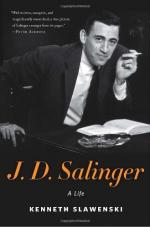|
This section contains 4,164 words (approx. 14 pages at 300 words per page) |

|
This is 1979, and it has been twenty-eight years since Holden Caulfield dragged his deer-hunting cap and his prep-school heart through Manhattan. But J. D. Salinger's ideas on the true and the false in American culture, his religious solutions to the crises of alienation and isolation, and his overriding sentimentality may have had more impact on the American brainscape than anyone yet has taken into account. Since the publication of a long story, "Hapworth 16, 1924," in The New Yorker in 1965, Salinger has maintained a silence that has turned him into the Howard Hughes of American literature. But Salinger's lasting significance has not declined. The startling thing for many of us to realize is that the confidential ravings of Holden Caulfield, the enigma of Seymour Glass's suicide, and the pathetic pragmatism of the Jesus Prayer embraced by Franny Glass, remain part of our consciousness—and it is not just simply nostalgia...
|
This section contains 4,164 words (approx. 14 pages at 300 words per page) |

|


